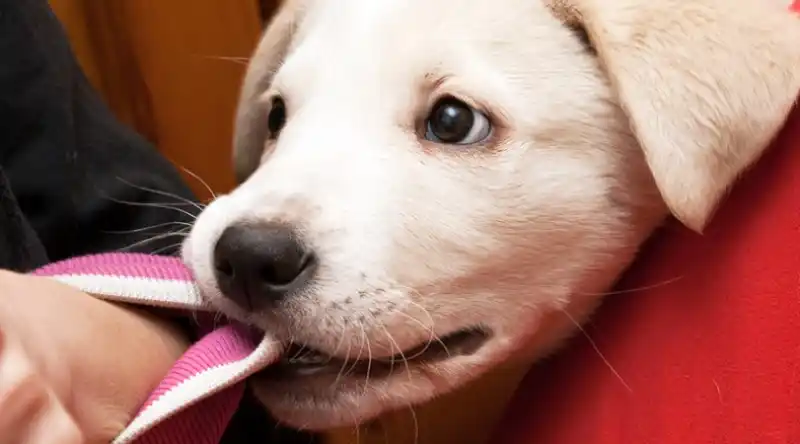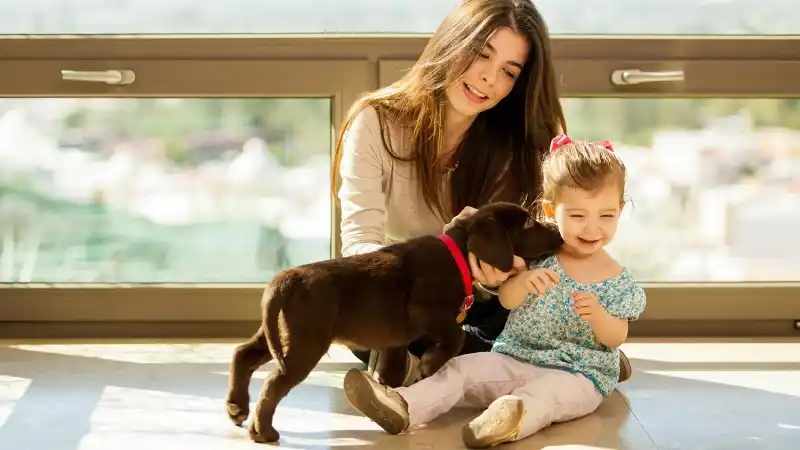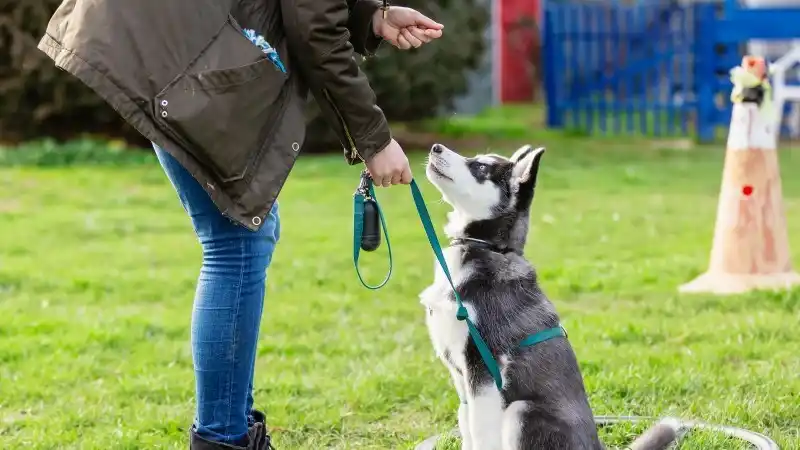Puppy Housetraining 101
Housetraining a puppy can be really frustrating. Explore tips on making training run as smooth as possible while helping your new pup stay on track.
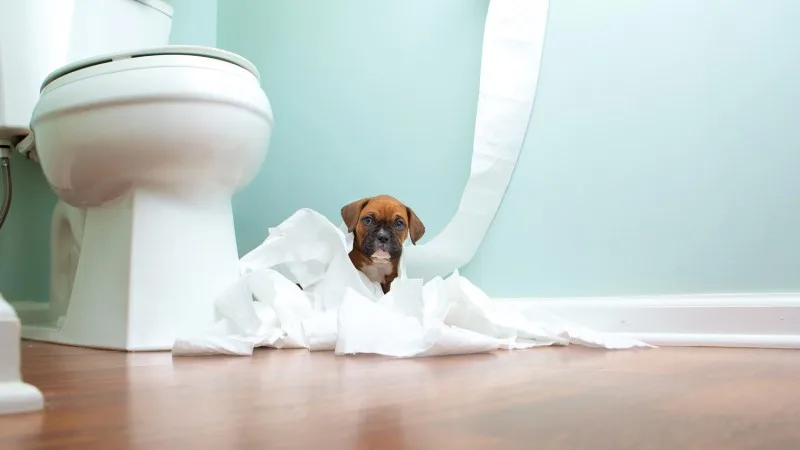
Accidents in the house are a normal issue that puppy owners have to deal with. Even older, trained dogs can fall offer the wagon. These housetraining tips can help pups of all ages get on track!
It is important to note that any unusual urination/defecation, especially with older, trained dogs, should be reported to your veterinarian as it may have medical causes.
The Two Keys to Housetraining a Puppy
24/7 Training: Watchful Eye and Confinement
Your pup should be under direct supervision or confined at all times. Consistency is key when it comes to housetraining, so staying diligent about this supervision is imperative for success. Good options for this are in a crate or on a leash. Crates should be large enough that the pup can stand up, move around, and lie comfortably, but small enough that they do not want to soil their “house.” When outside, your pup should be with you on a leash, so that you can praise your pup when they have done well and monitor their eliminations.
Give Feedback After Elimination
Your pup should be rewarded immediately after “doing their business” outside successfully. Healthy puppy treats are often a good reward. Other dogs feel rewarded enough by an excited “Good boy!” or “Good girl!” and a pat. Rewards should take place within 2 seconds of finishing. (Puppies have a very short attention span!) Every attempt at eliminating indoors should be interrupted and redirected outdoors even if the deed has already been done. This is where the watchful eye part comes into play.
Business Before Pleasure
Your pup should learn that business is always going to come before pleasure.
For consistency, pick an area in your yard that will be the “potty area.” Always take your pup out on a leash even if you have a fenced-in yard. This is so you can monitor their eliminations and offer immediate praise.
As difficult as it might be, refrain from giving any attention or play until AFTER your puppy eliminates. The more you engage your puppy, the less likely they are to focus on the task at hand. A good rule of thumb is to stay outside for no more than 5-10 minutes to give ample time and not feel rushed.
After success, you can reward your pup as previously mentioned with a healthy puppy treat or verbal praise. Again, rewards should be given within 2 seconds of elimination so the pup associates the praise with pottying outside. After that, you can offer attention, playtime, a walk, or off-leash time (if it is safe to do so). These activities serve as another reward for good behavior and encourage your young pup to hurry up during toilet trips.
How to Handle Accidents
With potty training, accidents are inevitable. The only time you can address an accident is in the moment it is happening. Interrupt accidents with clapping or a distinct (but nonaggressive) verbal cue, but refrain from harsh punishment. Harsh noises or voices may scare your puppy and, in the future, they may refrain from going to the bathroom in front of you at all! Startle them just enough to make it unpleasant, then bring them outside to their spot to finish.
If you notice the accident any more than 15 seconds after it happens, you are better off not giving them feedback at all and just cleaning it up. Make a note to self to pay better attention next time.
Cleaning Tip: Clean up any accidents with an enzymatic cleaner or a 50/50 solution of water and vinegar. Avoid ammonia-based products.
When to Take Your Puppy Out
Your pup should be taken out for a potty break at regular intervals based on their age. Most puppies will be able to hold it the number of hours equal to their age in months, plus or minus an hour with a maximum of 8 hours.
For example:
2 months old = 1 to 3 hours
4 months old = 3 to 5 hours
6 months old = 5 to 7 hours
Puppies should also go out immediately after waking up, during/after playing, and after finishing a meal.
Puppies Need a Schedule
Some puppies benefit from a regulated food/water schedule. This trains their system to eliminate at more predictable intervals. Putting away your puppy’s food and water 2 hours before bedtime can help them to make it through the night. During the day, offer your puppy water for 10-15 minutes at a time and the best time is after they go outside. Then remove water until next time.
Training a Puppy 101
Whether your pup is 8 weeks old, or 8 years old, these tips can help you get on track with housetraining. If these tips don’t work for you, contact a qualified professional to get hands-on help!
Take some of the stress out of pet ownership with Accident & Illness Coverage from AKC Pet Insurance (underwritten by Independence American Insurance Company). Our pet insurance plans are designed to be there when you need them, allowing you to focus more on the health of your pet and less on costly veterinary bills. Click here for a quote today!
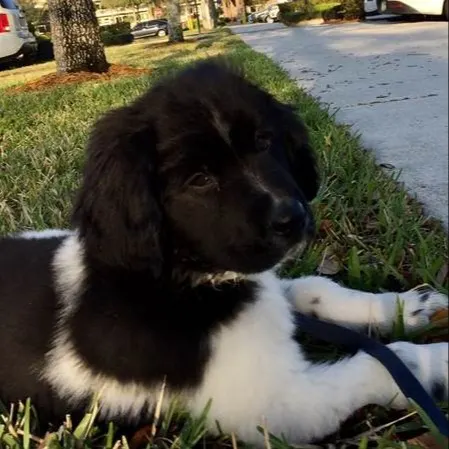
Justin Moorman graduated at the University of Lincoln, England where he received his Masters in Clinical Animal Behavior in 2012. Completed his Bachelor’s in Animal Health Technology at Murray State University in 2008. He is a Registered Veterinary Technician, has been in veterinary field for over 14 years, and has been training professionally for 7 years. He has a special interest in feline agility training, communication through body language, and pheromonatherapy. Justin now lives in Cary, NC with his cat Ami, Newfoundland Brego, and fiancee Nicole. In his spare time he enjoys historical swordsmanship, learning Japanese, and playing tabletop games.
READ MORE ARTICLES